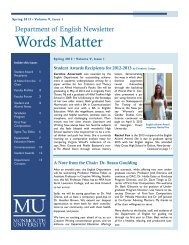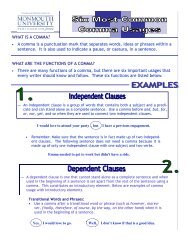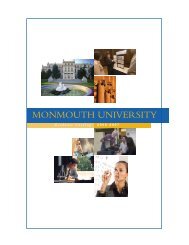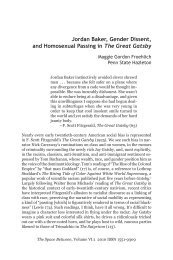students tout MU's - Monmouth University
students tout MU's - Monmouth University
students tout MU's - Monmouth University
You also want an ePaper? Increase the reach of your titles
YUMPU automatically turns print PDFs into web optimized ePapers that Google loves.
“<br />
UNLESSALL<br />
HAVE FREEDOM AND JUSTICE,<br />
IN THE FUTURE ...<br />
NONE WILL HAVE IT,<br />
—NOT EVEN AMERICANS.<br />
can solve every problem, and that states<br />
and democracy can solve no problem. It is<br />
privatization and marketization strategies<br />
that have actually undermined the authority<br />
of democratic governments. The recall<br />
election in California—like the Howard<br />
Dean and Wesley Clark candidacies, and<br />
like President Bush’s own candidacy in<br />
2002—were all about anti-political candidates.<br />
All of them involved candidates<br />
who were running against government as<br />
outsiders. Whether or not then-Governor<br />
Bush or Arnold Schwarzenegger were<br />
really outsiders to the political process is<br />
an obvious question, but the fact that they<br />
identified themselves in that role and sold<br />
themselves as outsiders to politics, as nonpoliticians,<br />
suggests the degree to which<br />
democratic governments and democratic<br />
politicians have fallen into disrepute as a<br />
result of the privatization of politics.<br />
So to come full circle back to the original<br />
question: Though the President in<br />
national security affairs and in war has a<br />
good deal of power, the long-term problem<br />
for America is that the American people<br />
seem to be disempowering themselves as<br />
“<br />
citizens, even as they empower themselves<br />
as consumers. They are taking power from<br />
the political, where they have real representation,<br />
where there’s accountability,<br />
and turning it over to the economic sector,<br />
where they have no real power. And this<br />
means a kind of hemorrhaging of popular<br />
sovereignty in favor of the sovereignty of<br />
private corporations, the sovereignty of<br />
money, the sovereignty of the economic<br />
over the political. That strikes me as the<br />
more serious problem.<br />
�<br />
IN THE FEDERALIST PAPERS, JAMES MADISON STATED THAT<br />
THE LEAST DANGEROUS BRANCH OF GOVERNMENT IS THE<br />
JUDICIARY. HOWEVER, RECENTLY, THE JUDICIARY HAS<br />
BEEN ARGUABLY THE MOST IMPORTANT POLICY SETTER—<br />
IN ROE V. WADE AND BROWN V. BOARD OF EDUCATION, THE<br />
SUPREME COURT HAS BEEN THE FINAL ARBITER.<br />
COMPLICATING THE MATTER IS THAT THE SUPREME COURT<br />
IS THE ONLY BRANCH OF GOVERNMENT NOT ELECTED BY<br />
THE PEOPLE. IS THIS BALANCE OF POWER STILL VIABLE IN<br />
A GROWINGLY HETEROGENEOUS U.S. SOCIETY? DO YOU<br />
FORESEE THAT OUR COUNTRY WILL CONTINUE TO APPOINT<br />
RATHER THAN ELECT SUPREME COURT JUSTICES?<br />
R<br />
eplacing appointed justices with<br />
elected justices just might mean that<br />
Jesse Ventura and Arnold Schwarzenegger<br />
will one day be not only governors of big<br />
states, but also members of the Supreme<br />
Court. So I’m not sure empowering the<br />
people to elect Supreme Court justices<br />
would be an improvement. Moreover, the<br />
Supreme Court is often unpredictable. Its<br />
Nixon appointees and Reagan appointees<br />
have, in some cases, taken liberal positions<br />
with which conservatives today are<br />
unhappy. So courts are less predictable in<br />
terms of expected political partisanship<br />
than we think. Remember, the justices<br />
serve for life. My own view is that their<br />
ideological persuasion on social issues is<br />
not really the problem. The problem is<br />
more the increasing willingness of the<br />
Court to intervene in democratic elections.<br />
In Gore v. Bush, the Supreme Court<br />
gave Bush the Presidency, despite the fact<br />
that there were irregularities in the<br />
Florida voting process and despite the fact<br />
that Bush won only a plurality, not a<br />
majority, of the votes—fewer votes, actually,<br />
than Gore. The issue in my mind is:<br />
Should the Court have even been involved<br />
in deciding this case?<br />
I’m glad the California Supreme Court<br />
refused to delay the recall, even though I<br />
was against it. Interventionist decisions<br />
effectively put the Court in the business of<br />
politics, which is contrary to the single<br />
most significant objective intended by<br />
separating the judiciary from the executive<br />
and legislative ranks: to insulate the<br />
political process from the courts and to<br />
insulate the courts from the political process.<br />
What we are seeing today is that the<br />
courts are much more politicized than<br />
they were intended to be. But even more<br />
important, the legislative and electoral<br />
processes are being “judicialized”—<br />
turned into a set of questions that the<br />
judiciary is supposed to answer. Those<br />
who argue for judicial conservatism ought<br />
to be consistent and admit that judicial<br />
conservatism requires the courts to stay<br />
out of and away from elections—just as far<br />
away as they can. The very opposite has<br />
happened in recent years.<br />
FALL 2003 • <strong>Monmouth</strong> <strong>University</strong> Magazine 7














